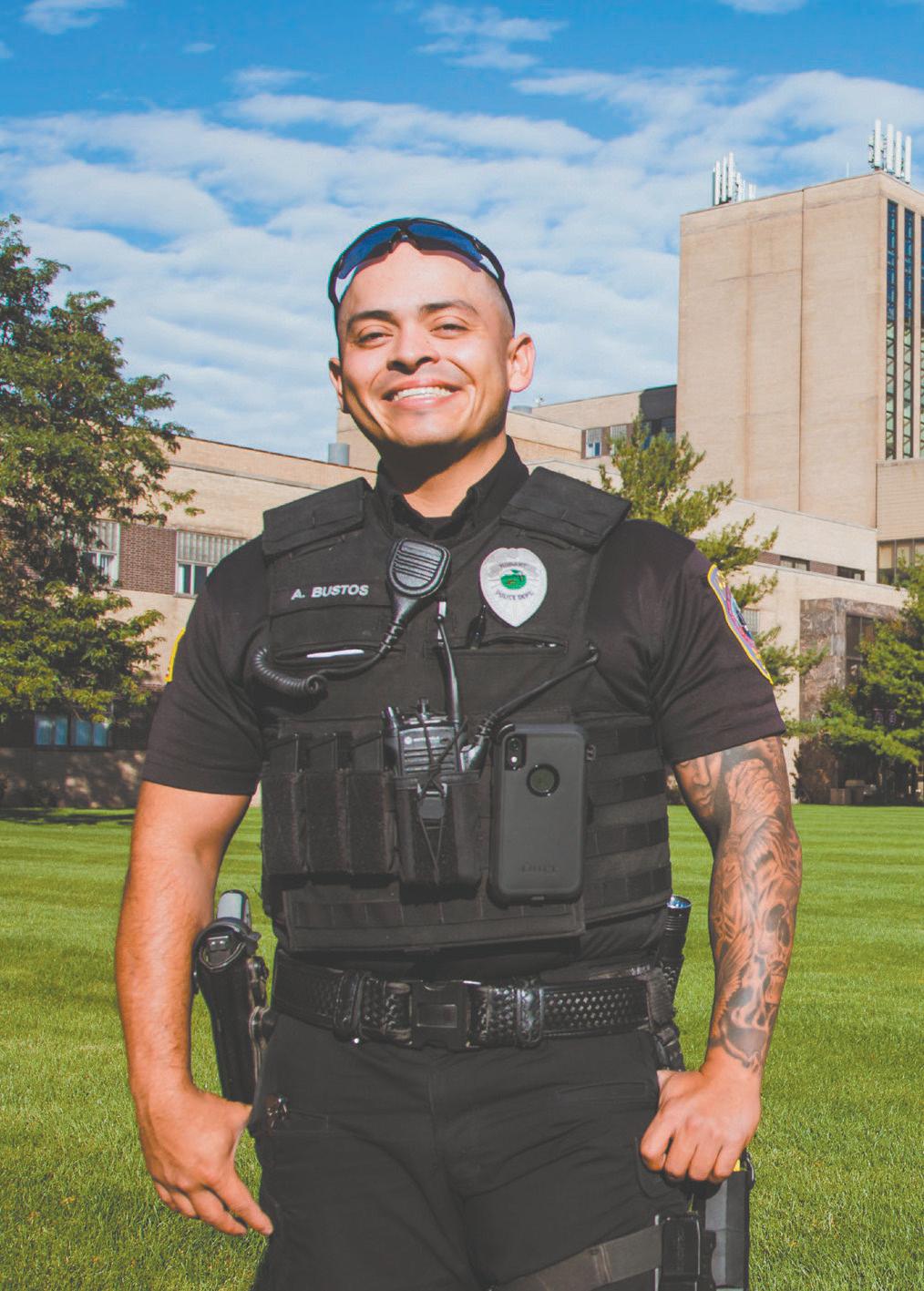Rap SHEET the



Connecting to mental health treatment when needed is critical for members of our profession


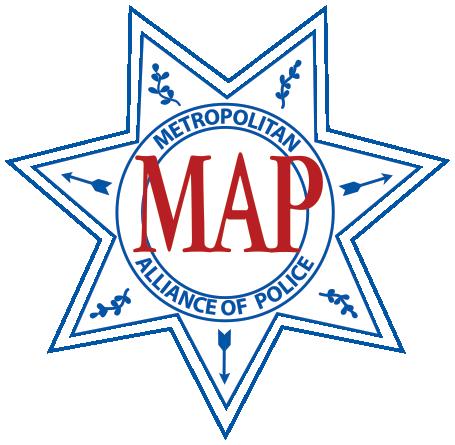
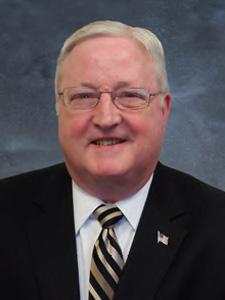
As we close the books on 2022, it has been an interesting year for police officers, public safety personnel, and the house of labor. MAP has, and continues, to be diligent in protecting our members' rights. We remain committed to advancing our members’ goals through our leadership in the Coalition of Frontline Police Officers, our lobbyist, and our enhanced legal defense program. These efforts, coupled with the passing of the Worker’s Rights Amendment, has added additional protections for our members. I want to express my sincere thanks to you, to your families, and to those who supported our efforts to pass the Worker’s Rights Amendment. This amendment should eliminate the legislators’ ability to reduce our fundamental right to collectively bargain over wages, working conditions, and safety. The reason this was such an important amendment is, it not only cleared the way for working people to unionize, but it preserves and protects the benefits we have already bargained. Many are not aware, but the initial drafts of the SAFE-T Act sought to eliminate many of those benefits, especially our capacity to negotiate working conditions

for our members.
We are still evaluating the exact impact the SAFE-T Act will have on our members. Rest assured, MAP is diligently working to protect your job security and your rights. MAP’s enhanced legal defense was specifically designed to add an additional layer of protection for our members under threat of criminal prosecution and/or decertification. MAP’s innovative programs will ensure our members receive legal representation throughout the entire process. We recently added an additional in-house attorney to assist with these anticipated undertakings.
The SAFE-T Act continues to be controversial; in fact 100 out of the 102 county state’s attorneys of Illinois filed a lawsuit naming the Governor as a defendant. Though their issues are primarily in opposition to the No Cash Bail laws, they also raised additional procedural questions concerning the constitutionality of such an omnibus act. MAP was asked to file an amicus curiae brief (friend of the court brief) to support overturning the SAFE-T Act. Though we agree with Plaintiffs’ position,
our opposition goes much further than the abolishment of cash bail. To be more precise, we have grave concerns regarding licensing/decertification, the potential of criminal liability, and both substantive and procedural due process issues, just to highlight a few.
2023 is already shaping up to be an interesting year. As you know, Illinois has recently passed a new assault weapons ban. Many police unions have voiced their opposition to the parts of the bill that initially did not create exceptions for current and retired law enforcement officers. I am also aware of some elected sheriffs who have indicated they will not openly enforce the new law. Stay tuned!
On another note, I would like to extend our sincere thanks to Chaplin Deacon Thomas Ross. Deacon Ross has been a fixture in our organization for decades, many of you probably recognize him from his many articles in Chaplin’s Corner, from our quarterly magazine. Many of his family worked as public servants, which provided him with unique insight. That rare understanding was reflected in his many articles. Good luck to him, and again, thank you!
IN CASE OF EMERGENCY
If you are involved in a critical incident or need to contact MAP for any emergency, call 630-905-0663.
This article is the second in a series developed by the American Foundation for Suicide Prevention, Illinois Chapter, for THE RAP SHEET. These research-informed reports are intended to provide MAP members with facts about mental wellness and suicide prevention. The more you know, the easier it will be to talk about these health issues and take appropriate action to help yourself and others.
This article is the second in a series developed by the American Foundation for Suicide Prevention, Illinois Chapter, for THE RAP SHEET. These research-informed reports are intended to provide MAP members with facts about mental wellness and suicide prevention. The more you know, the easier it will be to talk about these health issues and take appropriate actions to help yourself and others.
Recap: Our first article discussed risk factors for suicide: health, historical, and environmental. Suicide risk factors are characteristics or conditions that increase the chance that a person may take their life. Suicide occurs when multiple risk factors converge and there is not a successful intervention at the time of the person’s suicidal action.
Just as there are factors that increase suicide risk, there are factors that help to reduce such risk. These factors are known as protective factors. Examples include:
• Access to appropriate mental health care
• Positive attitude toward mental health treatment
• Social support and community connectedness
• Effective coping/resiliency skills
• Problem-solving skills
• Cultural/religious beliefs
• Self-care
• Limiting access to lethal means
Connecting to mental health treatment when needed is critical to suicide prevention. The fact is that many millions of folks face mental health challenges at one or more points during their lifetimes. Unfortunately, less than half of people with a mental health condition seek treatment. We need to view mental health like any other aspect of our health; there are certain times when a person
becomes ill and it’s critical to seek the help of a trained professional. And just as with other types of health issues, if a person feels they are not receiving appropriate care, they should not hesitate to seek a mental health professional better suited to them.
There are many types of treatment available, like various kinds of psychotherapy and medications. Research has shown that for many people the combination of psychotherapy and medications tend to be the most helpful. But the most important thing is to find the treatment that works best for the individual.
ACTIONS:
1. Make mental health a priority
2. See a doctor/mental health professional
3. Discuss treatment options
4. Find out what is best for the individual
Having positive and supportive relationships -- family, friends, coworkers -- and strong community connections can help protect against suicide risk. Research has also shown that supportive workplaces can serve as a protective factor for suicide. The workplace can provide important structure and help foster relationships and a sense of connectedness. In addition, work can offer people a sense of purpose, as well as a sense of identity. All these factors provide people with reasons for living.
ACTIONS:
1. Develop and nurture relationships that are positive
2. Stay connected to the community
3. Help foster a supportive workplace that
a. Provides a person-centered social structure
b. Provides meaningful work
c. Offers a sense of purpose
d. Offers a place of solidarity
Self-care strengthens mental health. Just as people can find strategies that optimize their physical health, people can do the same for their mental health. In addition to professional mental health care, proactive selfcare strategies like good sleep habits, exercise, nutrition, and stress management can also play a crucial role.
ACTIONS:
1. Exercise regularly
2. As much as possible, practice healthy sleep habits
3. Find a healthy diet that makes sense for you, and stick to it
4. Make stress management activities routine, both on and off the clock
Research shows that by temporarily reducing a suicidal person’s access to lethal means, we buy suicidal individuals time – time for the intense suicidal risk to diminish and time for someone to intervene with mental health support and resources. It is a myth that if people can’t access their chosen means they will find another one. In fact, if they are unable to access their chosen method even temporarily, the majority of people at a suicidal crisis point are unlikely to engage in a different action at that time to end their lives.
During a period of high risk, the safer their environment is, the better chance a suicidal person has of living through that crisis period.
For law enforcement officers, firearm safe storage is critical to reducing officer suicide rates. Studies have demonstrated that in the general population the mere presence of a firearm in the home significantly increases the risk of completed suicide. This is even more true in the officer population, which has a far higher rate of suicide. Research shows that most officer suicides occur at home, using the officer’s own service weapon. This would suggest that during a period when an officer is at elevated risk of suicide and/or is exhibiting suicide warning signs, the officer’s service weapon should temporarily be secured elsewhere than in their home.

Next Issue: Warning Signs of Suicide. For further information, visit afsp.org. If you need immediate assistance, please call or text 988.
IN CASE OF EMERGENCY
If you are involved in a critical incident or need to contact MAP for any emergency, call 630-905-0663.
It’s time, you have heard my voice in this column for many years and I believe it is time for another view. Yes, this is my last column for the MAP newsletter. I recently met with MAP management and discussed the future of this column, and I am happy to report they do have arrangements to continue this column.

For many years I have been granted a chance to speak with MAP members through this column on various topics I thought would be relevant to you in your career in policing, life issues and faith. I do hope some topics were of interest to you and helpful in your work. I have been involved in Police Chaplaincy for over 30 years and I got into this ministry with a son in fire service and another In law enforcement and then years latter another son joined the policing role. Now two of the three are retired and on to different careers so that got me to thinking it was time to allow another voice to be heard through this column.

I appreciate the support of MAP management over the years in granting me this megaphone to speak with MAP members. I have never been a union member in my career, so I speak as an outsider to echo support of MAP and what they do for their members. I have experienced firsthand that they have been at your side in difficult times and have the experience going forward to this new level of laws that will affect you in your career.
Thanks for reading and for your return comments. Stay strong and know you are special individuals that have been chosen to serve your communities and also know the community strongly supports good policing and respect your office.




God Bless, stay safe.
 Chaplain Tom Ross, Sr Sligo8@wowway.com
Chaplain Tom Ross, Sr Sligo8@wowway.com




ILLINOIS POLICE OFFICERS’ PENSION INVESTMENT FUND ANNOUNCES
MORE THAN 90 PERCENT OF THE STATE’S ARTICLE 3 POLICE PENSION PLANS
TRANSFERRED ASSETS TO CONSOLIDATED FUND IN 2022
With 2023 underway, we are excited to let members of the Metropolitan Alliance of Police (MAP) know that as we close the books on 2022, more than 90 percent of the state’s Article 3 local police pension plans will have transferred assets to the Illinois Police Officers’ Pension Investments Fund’s (IPOPIF) as mandated by Public Act 101-0610. We are very proud of this accomplishment and our small team at IPOPIF as it was achieved working closely and collegially with the representatives of Article 3 police pension plans from across the state.
Starting a pension investment trust fund plan from scratch is a formidable task and we appreciate the assistance of many members of MAP who assisted us during the last 30 months. Our grateful thanks to each of you
involved!
As of December 1, 2022, of the 357 Article 3 funds statewide, 327 have or are in the process of transferring funds via seven monthly tranches. When these asset transfers are completed, the IPOPIF consolidated fund will have approximately $8.5 billion in assets. There are 15 local funds that are not scheduled to transfer as they are plaintiffs in the lawsuit questioning the constitutionality of the law creating IPOPIF and the Illinois Firefighters Pension Investment Fund and 15 funds that were placed in “Did Not Transfer” status when they failed to transfer funds as scheduled. The combined assets of those funds is $1.35 billion.
As you may be aware, at its September 9, 2022 meeting, the IPOPIF Board of Trustees

set 6.8 percent as the expected rate of return for the fund. Research conducted by our investment and actuarial consultants showed that this is in the range that our public pension fund peers have set for their funds.
During the October 14, 2022, meeting of the Board of Trustees, the board approved the candidates for the election and authorized the election process for the Board of Trustees. Because the nomination process qualified the minimum number of candidates for each trustee seat, an election did not need to be conducted and the Board of Trustees acted under its authority to declare the election of candidates completed and certified the election of the following trustees:
• Municipal Member Trustee (1 seat), Philip J. Suess, mayor of Wheaton.
• Beneficiary Member Trustee (1 seat), Daniel Hopkins, retired police officer, Police Collinsville Department.
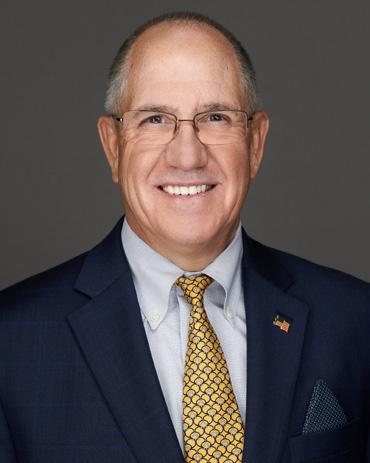
• Active Member Trustee (2 seats), Lee Catavu, sergeant, City of Aurora Police Department and Paul Swanlund, police officer, Bloomington Police Department.
The seating of the trustees to the Board will occur at the January 27, 2023, meeting. All Board of Trustees meetings are in-person at our offices in Peoria and also conducted remotely via the Zoom platform. For information about joining the meetings remotely and the agenda, please refer to the meetings page on our website.
“Monthly flash” reports for 2022 have been posted on the IPOPIF website. Detailed quarterly reporting has also begun. A comprehensive performance review from our investment consultant, Verus, covering the second quarter can be found here. On page 6 of the report, you will find a table below shows periodic, since-inception performance through June 30 for the IPOPIF fund relative to comparative passive benchmarks.
As we all know, investment markets have been challenging so far in 2022 with concerns about inflation, rising rates, and slowing economic activity negatively impacting most investments.
I’m pleased to let you know that on October 3, 2022, IPOPIF announced that Regina M. Tuczak joined the fund as finance director and assistant executive director. Tuczak, who reports to me, will be primarily responsible for the financial
operations of IPOPIF while also having managerial responsibilities for the administrative operations of IPOPIF. Her duties will include planning, organizing, and directing IPOPIF’s finance operations as well as advising the executive director on all matters relating to the operations of IPOPIF.
As demonstrated by her tenures with Cook County and Chicago retirement funds, Regina embodies a commitment to and understanding of the importance of IPOPIF staff discharging our duties with integrity and solely in the best interest of the individuals we serve. We are fortunate to have her become a member of the IPOPIF team.
Tuczak joins the fund from the County Employees’ and Officers’ Annuity and Benefit Fund of Cook County and the Forest Preserve District Employees’ Annuity and Benefit Fund of Cook County where she had served as executive director since December 2018. Previously, she served as executive director of the Policemen’s Annuity and Benefit Fund of Chicago. She began her career in the accounting field working for Deloitte & Touche LLP and Arthur Andersen LLP.
In mid-July, Barbara Meyer joined IPOPIF as an investment officer. Like her colleague Steve Yoon, she provides important support for the asset transition project underway. Following the completion of asset transition, she will manage and monitor key investments and processes.
Prior to IPOPIF, Barb was an investment portfolio manager at Chicago Teachers’ Pension Fund (CTPF), where she focused on investment selection and monitoring for the public markets equity portfolio. Previous experience with pension
and retirement savings plans includes consulting and client relationship management roles with Mesirow Financial, Northern Trust, and Ibbotson Associates.
2022 was a significant year for all involved and we very much appreciate the time and consideration of the Article 3 local plan officials and their advisors and custodians who have worked in tandem with our team to ensure the process is handled professionally.
In 2023, we hope to begin hosting webinars during which IPOPIF's investment staff and our outside investment consultants from Verus Advisory, will review quarterly investment reports, asset allocations, etc. and answer questions. In the interim, key investment information is posted to the IPOPIF website and is reviewed and discussed at the IPOPIF Board meetings which are open to the public and available via Zoom. Check for meeting dates and times here. The link to the Zoom call is included in the meeting agendas which also are posted on our website.
Best wishes for a Happy and Healthy 2023. We look forward to working with you in the new year.
If you have any questions and would like to speak with a member of the IPOPIF team, feel free to call us at 309-280-6464 or email me at rwhite@ipopif.org




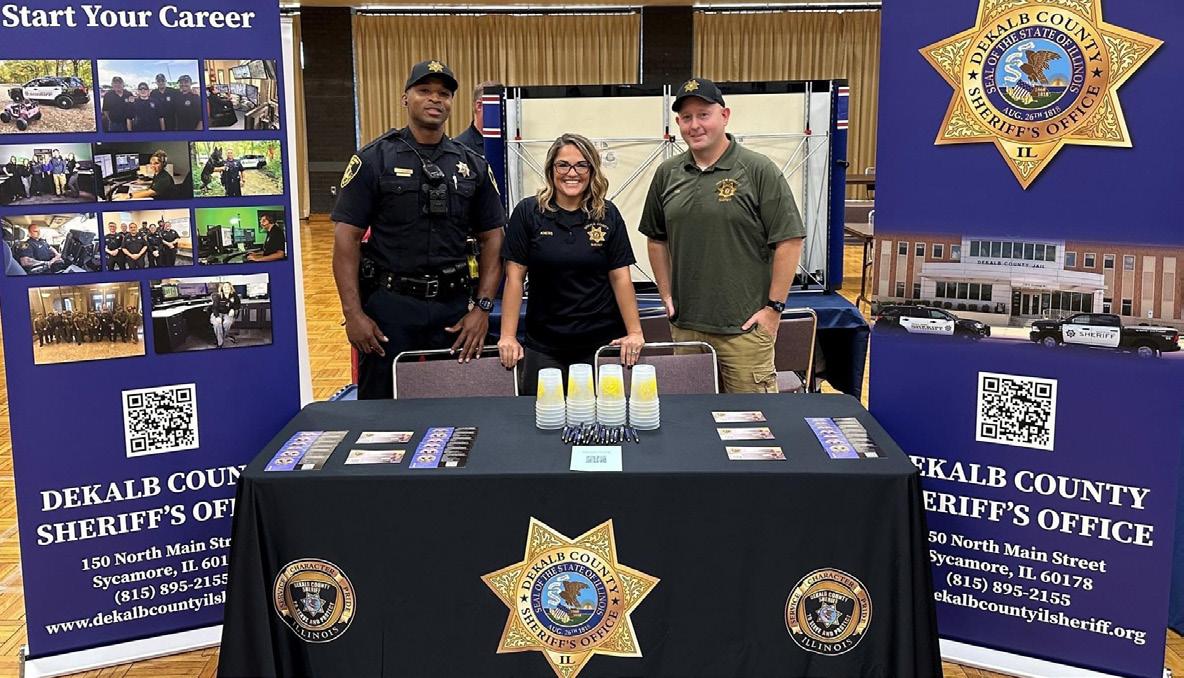
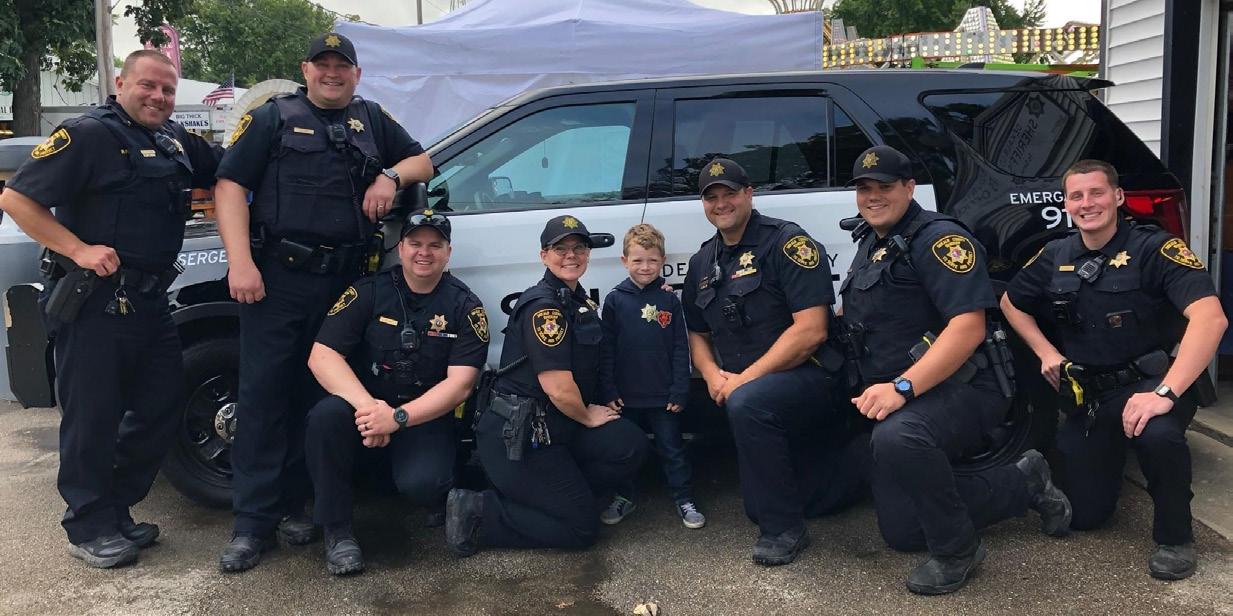
Dekalb County Sherriff’s Office is home to MAP Chapter 318, a department that has continued to strive for excellence and keep their community safe while doing so. Deputy Matt Marks and Chapter President and dispatcher Becky Taft strive for open communication in their department and forward-thinking improvements.

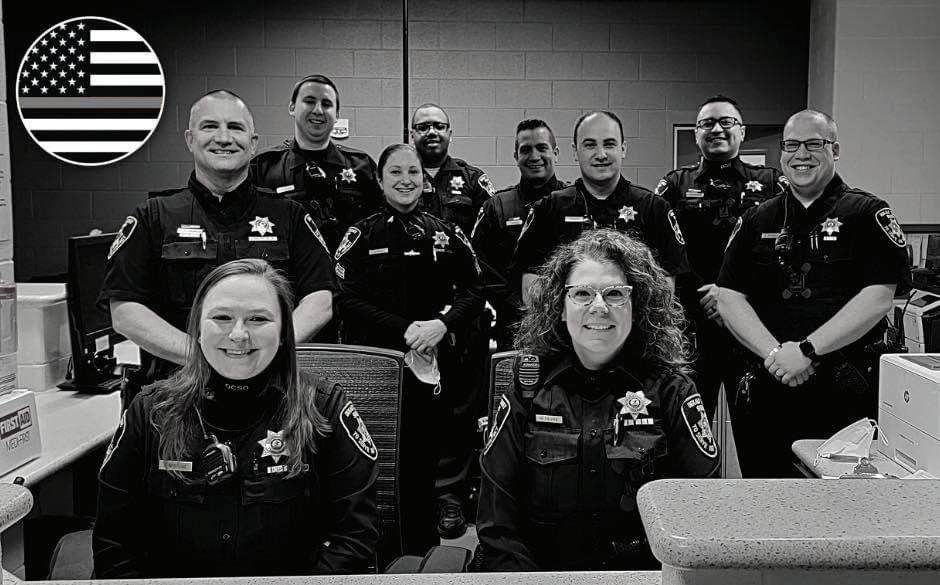
Deputy Matt Marks holds several specialty assignments as a patrol deputy. “I’m also a field training officer and right now I’m training one of our newest deputies on the road,” says Marks. “I’m also the firearms instructor, traffic crash investigator and there’s quite a few things I do for the department within the patrol field.”
DeKalb Sheriff’s Office has a corrections, patrol and communications division. “I’ve worked for DeKalb for ten years,” says Marks. “As long as I’ve been here, we’ve been with MAP. They’ve mostly been a help to me contract-wise and they’ll provide us with handouts and things like that to show us they are there to support us and be there for us – everything through retirement.”
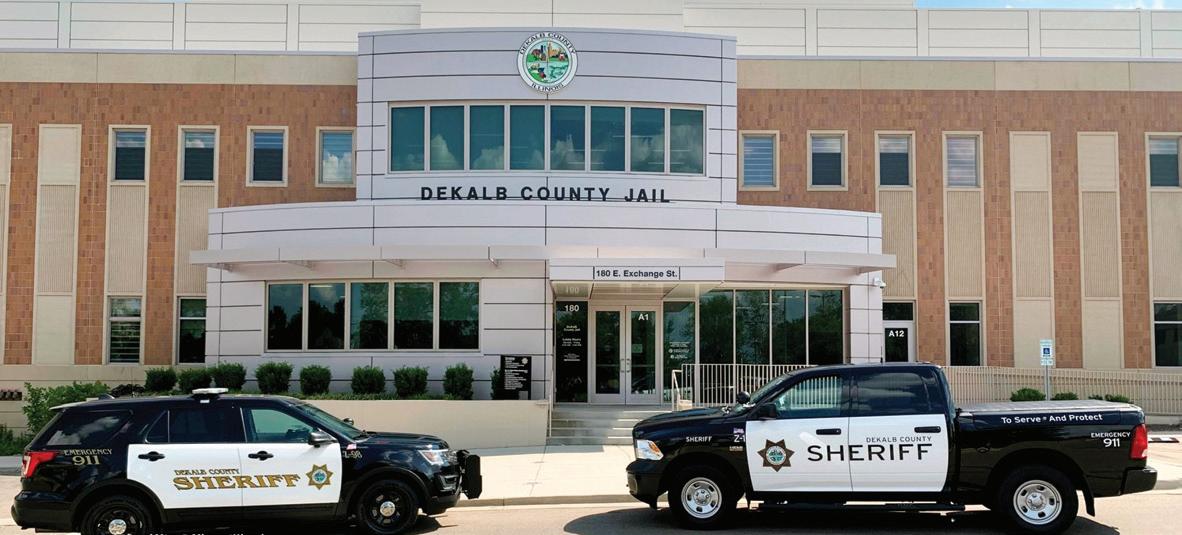
“At the Sheriff’s Office, I am a communications deputy, 9-1-1 dispatcher, telecommunicator,” says Taft. “We dispatch 12 fire agencies, ten police departments and the Sheriff’s office. We dispatch police, fire and EMS and we are also MABIS* Division 6, so we dispatch all MABIS’s in our area.”
Taft has been chapter president since 2020, keeping negotiations and the communication running smoothly. “I coordinate meetings,” says Taft. “Our bargaining team is going through our contract negotiations right now and this is my second negotiation as president. Coordinating that team and getting everybody together, that’s always a big undertaking – getting everybody’s ideas down and discussing the contract. Especially with everything that’s been going on these past few years, I think MAP has been very great at sending out letters for what’s coming, what’s going on, what the legislation means or what they’re trying to do to change the legislation.
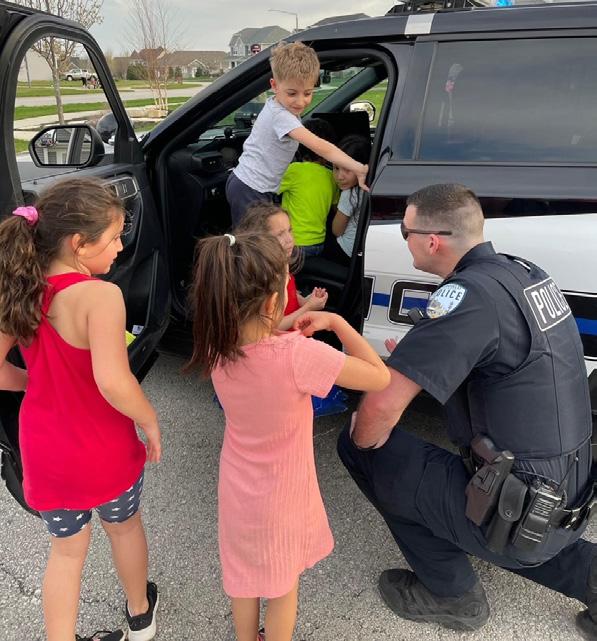
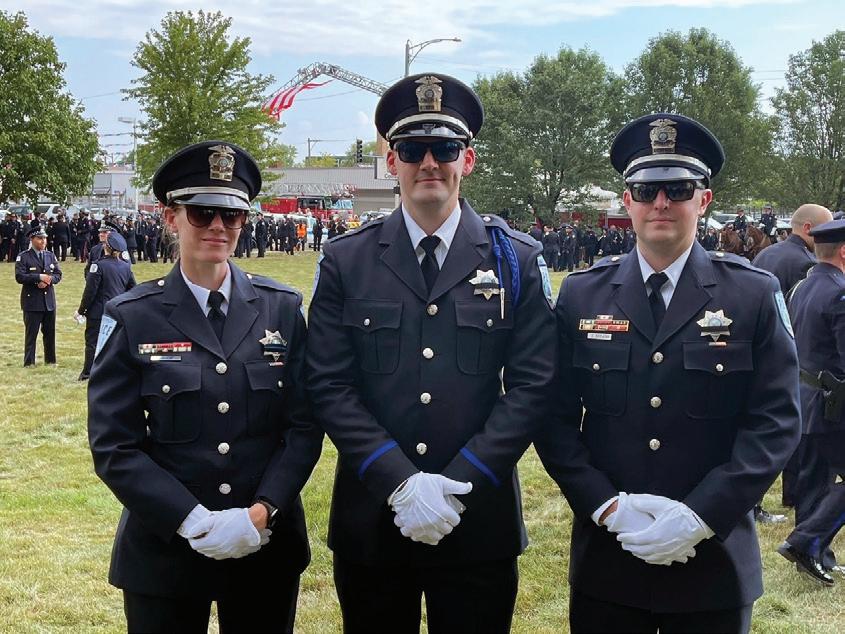
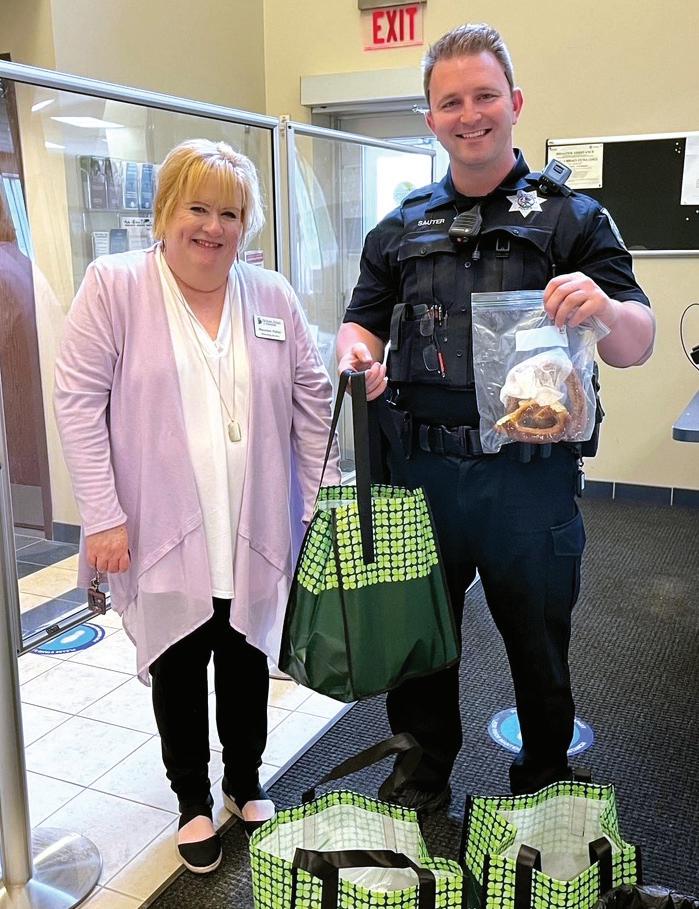
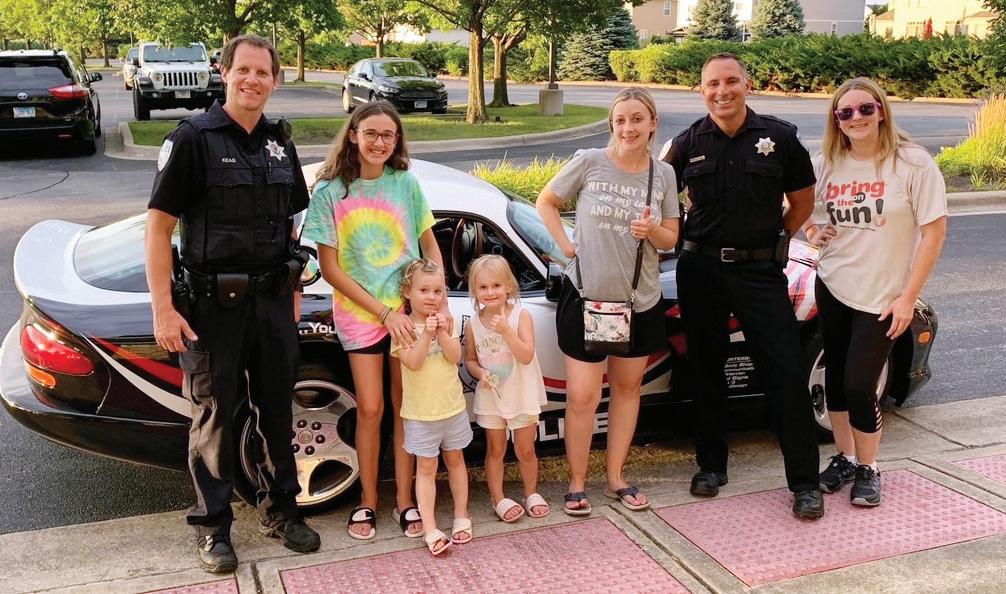




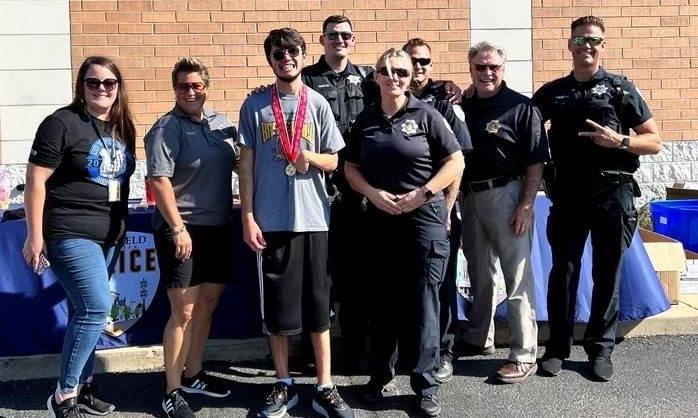
Chapter president of Chapter 93, Brian Wagner is a school resource officer in the district of 202.
“It’s completely different from patrol,” says Wagner. “You have a whole new set of employees and peers that you work with. Not only are we representing the Village of Plainfield and the Police Department, but we also have to act as a liaison for District 202. We have seven school officers, two elementary/D.A.R.E officers, one middle school officer, three high school officers, then the alternative middle school/high school officer. It’s a pretty big unit and we’re all membership based at Chapter 93. We work with the schools, it’s not about just enforcing the law, we are also first contact for some of these kids’ law enforcement experience.”
For years, Chapter 93 was a tight-knit unit with excellent retention until recently when the district started implementing a series of new hires. “Now we’re starting to see a lot of new membership come into our chapter,” says Wagner. “It’s awesome because you’ll see a lot of guys volunteer and get involved in the fundraising team and be on the union board.”
With recent changes to the law, Chapter 93 stays on top of new policy updates. “There’s been some new policy that’s come down and we had the opportunity to review them and say which parts we disagree with, and we can work together to come up with a better policy that suits everyone’s needs,” says Wagner. “We want to improve communications and have openness with every division. For example, I don’t get to see everyone from patrol on a daily basis. We want more communication between units.”
An average day of an SRO is busy, and each officer has to stay alert at all times. “Our two DARE/Elementary officers bop around,” says Wagner. “Our middle school SRO has an office at the station, but then he visits the five middle schools and then each respective high school SRO has an office or central area. At the Academy, I have a centralized office.”
Chapter 93 has been with MAP since the late nineties and Wagner praises the close bond they have had with the union throughout the years. “It feels like a small union because they are so personalized,” says Wagner. “I could reach out and text or call about even the small things. They are very approachable guys, they reach out and make sure they are here for us. They have also offered so much more over the past 20 years because they want camaraderie and communication. There has been so much MAP has done over the years to keep building a rapport with their members.”
Lately, Chapter 93 has improved in multiple areas, strengthening their core values and solidifying better contract terms. “I feel like we’ve made some huge strides with our union contact and people reach out to me on a monthly basis from outside agencies asking how we got certain things in our contract,” says Wagner. “They’ve gone above and beyond to help us with that.”
RON CICINELLI
NORTH AURORA
• 3 yr contract
• Wages: 2022 = 4.25% 2023 = 4.0% 2024 = 4.25%
SOUTH HOLLAND
• 4 yr contract
• Wages: 2021 = 2.0% 2022 = 4.7% 2023 & 2024 = 6% 2023 – receive a step adjustment of 3%
JOHN GAW
OLYMPIA FIELDS
• 5 yr contract
• 2.5%, 4%, 4% - last two years vary between 3-4% as a function of CPI
• Insurance – employees pay 20% of premium
• Vacation – 13-28 days based on years of service
• Personal/ Sick days – 10 per year, up to 30 banked, payout option each year
• Uniform allowance: $1,000
MARK MCQUEARY
CHANNAHON
• 4 year contract
• 3.50%, 3.25%, 3.0%, 3.00%
• End of CBA top apy from $88,824 to $100,702
• Arbitration of Discipline
• Employees shall be permitted to use vacation hours after 1 year of service
• Employees may immediately utilize sick time upon accrual
STEVE CALCATERRA
NIU SECURITY
• 7/1/22 to 6/30/28
• Wages:
2022 – increase $3.50 @ hour
2023 – increase $1.10 @ hour
2024 to 2028 NIU annual increases
NIU Tuition Waiver
NIU PATROL
• 2021 to 2027
• Wages:
• 3.0% restructure/ total 18-31% depending on step
WESTCHESTER SERGEANTS
• 5/21 to 4/24
• Wages: 3.25% / 3.25% / 3.0%
• Insurance: 15% by employee
• Vacation: 80-212.5 hrs per year
• Personal/ Sick Days: 8 hrs personal/ 48 hours
• Uniform: $925-975
MCHENRY CO COLLEGE
• 3 year contract
• Wages 3% for 3 years
• Vacation:
Years 0-3 160 hours
Years 11-19 168 hours
Years 20+ 192 hours
• Sick Hours: 96 hours per year/ provision for sick leave donation for fellow officers
• Bereavement Leave – 5 days
• College tuition waiver
JERRY MARZULLO
MOKENA PATROL
• 4 yr contract
• Wages: 3.5%/ 3.5%/ 3.25%/ 3% with full retro on all hours worked
• Increased Stipend pay for Detectives to $2,000
• Increased FTO pay from $1500 per year flat rate to 1 hour OT or 1.5 Comp time for each of training at member’s choice
• Expanded residency to 35 mile radius
• Added 1 Holiday
• Added RHS plan with both annual and end-of-career sick time buyback
• Added vision insurance at same percentage of premium split for health insurance
GLENVIEW
• 5-year
• Wages: Tier 1 (hired prior to July 2014: 2.25% per year for all five years)
Tier 2 (hired after July 2014: 3.5%, 3.5%, 3.5%, 3.75%, 3.72%) this will eliminate tier 2 pay disparity by end of the CBA.
• Increased pay scale for lateral hires
• Sick days: Implemented a new buyback program where 50% of unused sick time remains in the bank, and the other 50% of the unused sick time can be paid out to members or converted to vacation hours.
• No increase in health insurance percentages for members
• Guaranteed increase in holidays if Employer adds holidays to non-union personnel.
IN CASE OF EMERGENCY
If you are involved in a critical incident or need to contact MAP for any emergency, call 630-905-0663.
Updates from our attorneys about collective bargaining agreements for MAP members.
BLUE ISLAND
• 3 yr
• Wages: Effective 01/01/22 3.5% 01/01/23 3.5% 01/01/24 3% 01/01/25 3%
NEW LENOX SERGEANTS
• 3 year
• Wages: Effective 05/01/22 3% 05/01/23 2.5% 05/01/24 3%
• Addition of language prohibiting adverse employment action for a family member's use of cannabis
• Implementation of Retirement Health Care Funding Plan
OLYMPIA FIELDS CIVILIANS
• 5 year
• Wages: Effective 05/01/21 2.5% 05/01/22 4% 05/01/23 3.5% 05/01/24 3.5% 05/01/25. 3.5%
• Longevity increase of 2% for employees with 10 or more years of service
CLARENDON HILLS
• 3 yr contract
• Wages: 3.5%, 3.0%, 3.25%
• Multi-lingual and detective pay established
• Comp time – language improved.
• Increased OIC hourly pay
• Clarified right to representation language.
• Improved shift rotation language
KANE COUNTY PATROL
• 3 yr contract
• Wages: Elimination of tier 2 for topped out wages 4, 4, 4 with step compression from 9 steps to 6 steps
• Increased interpreter pay by $50 per month
• SWAT and Bomb Operator pay increased by $50 per month
NORTHLAKE PATROL & SERGEANTS
• 4 yr contract
• Wages 3.0%, 3.0%, 3.0%, 3.0%
• Increased annual sgt. stipend
• Increased sick leave buyout from 90 days to 105 days
• Created a sick leave bank for members to voluntarily contribute to a sick/injured officer in need
• Expanded shift bid by seniority
• Increased comp time bank max to 80 hours
Bartlett
Ryan Sieckman President
Russell Cionko
Vice President
Max Puente Secretary
West Dundee
Mike Slager President
Nate Herman Vice President
Paul Shipley Treasurer
Maywood Patrol
Christopher Wozniczka President
George Adamidis Vice President
Sean Earley Secretary
Wheaton Patrol
Shaun Lucas President
Chris Harpling Vice President
Crystal Miroballi Secretary
Ben Belcaster Treasurer
Homewood
Michael Kozlowski President
Brian Beauchamp
Vice President
Henry Renken Secretary
Kevin Radtke Treasurer
Hoffman
Estates Patrol
John Onorad President
Audrey Brunner Vice President
Kim Sterkowicz Secretary
Brian O’Shea Treasurer
Tom Henderson President
Dave Jannusch Secretary
Rollin Hamelberg Board Member
Brian Barkalow President
Cody Baumbach Vice President
Patrick Burke Vice President
John Kaldis Secretary
Marty Vittone Treasurer
Krzystof balon Sergeant of Arms
Szymon Pierscionowski Sergeant of Arms
If there is a question you would like MAP to answer, please email John at Jholiday@mapunion.org.
The information provided does not, and is not intended to, constitute legal advice; instead, all information, content, and materials available on this site are for general informational purposes only. You should contact MAP to obtain representation with respect to any particular legal issue related to collective bargaining and your union rights.
Answer from MAP Legal Counsel
This is a circumstance where timing matters.
A police officer must apply for disability benefits while still employed by the police department. Under Article 3 of the Illinois Pension Code, a pension board loses jurisdiction if the officer applies for disability benefits after they quit or are fired. Meaning, if an officer stops by the pension board secretary’s office and drops off an application for disability benefit on the way to a meeting with the police chief, the pension board has jurisdiction to consider the application. However, if that same officer dropped the same application off with the same person 1 minute after being fired by the police chief, the pension board would not have jurisdiction to consider the disability application. For those looking for a longer explanation, please read Keeling v. Forest Park Police Pension Board, 2017 IL App (1st) 170804.
Answer from John Gaw, MAP Staff Counsel
During the final moments of a lame duck session, the Illinois General Assembly passed an assault weapon ban, and the Govenor has signed it. This bill bans almost all semi-automatic rifles, as well as some shotguns and pistols. Large capacity magazines are banned as well. This new bill describes large capacity mags as more than 10 rounds for a rifle and more than 15 rounds in a handgun. What about interchangeable mags? That’s a good question - like the Safe-T Act, some parts of this bill are not very clear.
The bill changed numbers several times, but was eventually passed as House Bill 5471, Senate Amendment 003.
If you are involved in a critical incident or need to contact MAP for any emergency, call 630-905-0663.
This bill does not apply to police officers, or retired officers who are covered under IROCC, as an exception was written into bill. (See page 100 and 108 of the bill for this exception). The language provided references the “Law Enforcement Officers Safety Act of 2004” (18 U.S.C. 926B and 926C; sometimes referred to as H.R. 218). In short, if you are a police officer, or retire and are covered under IROCC, this current law would not apply to you.
QI am a civilian clerk for a local police department. I just heard that a complaint was filed against me by someone who I dealt with yesterday and I am being ordered to meet with my supervisor to discuss it. What should I do?
Answer from Steve Calcaterra, MAP Co-Counsel
As a union member in Illinois, you have the right to have your representative present during an investigatory interview that you reasonably believe can lead to discipline, commonly known as “Weingarten” rights. It is a violation of the Illinois Public Labor Relations Act to deny an employee their Weingarten rights.
Any meeting may be considered an “investigatory interview” provided that the following occurs:
• A manager, representative of management, or supervisor is seeking to question an employee.
• The questioning is part of an investigation into the employee’s performance or work conduct. During an investigatory interview, a representative of management may require an employee to defend, explain, or admit misconduct or work performance issues that may form the
basis for discipline or discharge.
• The employee reasonably believes that the investigation may result in discharge, discipline, demotion, or other adverse consequence to their job status or working conditions.
• The employee requests a union representative. Employers are not required to advise employees of their right to representation and third parties (including union representatives) may not make the request on behalf of the employee.
When making a request for a representative, you do not need to specify that they need a “Weingarten” representative. It is important to keep in mind that your employer does NOT have to tell you that you have this right – this is not like “Miranda” rights where a police officer must tell an arrested person that they have a right to an attorney. You MUST ask for a union representative to be present and if you do not ask for one then this right is waived. Once you have requested a union rep for the interview, your supervisor can either 1) allow you to have a union representative (co-worker) attend the meeting, or 2) reschedule the investigation for a later time when a union rep is available. If a union rep is available and you would prefer a different one, you do not have the option to reschedule the meeting but must instead attend with whichever rep is working at the time.
If your supervisor orders you to participate in an interview without a representative, follow the order but make it very clear that you want a union rep with you and call MAP as soon as possible!
Some collective bargaining agreements have clauses establishing “labor-management meetings”. An example of one of such clause is as follows:
“At the request of either party, the Chapter officers and WESCOM Director or Personnel Committee, may meet quarterly to discuss matters of mutual concern that do not involve negotiations. Such matters may include concerns regarding staffing, health and safety issues and training. The party requesting the meeting shall submit a written agenda of the items it wishes to discuss at least three days prior to the meeting.”
The spirit behind such clauses is to address issues quickly before they blossom into bigger disputes. Whatever the intent of the parties, here are some important tips when engaging in such meetings.
1. Are we discussing something that is a mandatory subject of bargaining?
MAP is the exclusive bargaining agent for all matters that are a mandatory subject of bargaining. Section 7 of the Illinois Public Labor Relations Act define mandatory subjects of bargaining as those which relate to wages, hours and other conditions of employment. The purpose of a labormanagement meeting is not to re-negotiate the CBA. An agenda should be drafted and sent to all attendees with the topics to be discussed at the meeting. If the stated purpose of a labor-management meeting is to discuss matters that should be brought up during negotiations, immediately contact your chapter representatives, MAP board member, and/or assigned chapter attorney for further instruction before agreeing to any meeting.
2. Beware of deadlines!


Agreeing to participate in a labormanagement meeting does not eliminate your obligation to file grievances or unfair labor practices within the prescribed time. Don’t blow a deadline to file because management is “working with you.” To avoid this, schedule a meeting prior to the due date of when something needs to be filed. An agreement to toll or delay the filing of grievances may reached by the parties. This agreement must be in writing. Again, your MAP board member and/or your assigned attorney can assist you with drafting such an agreement.


3. Document, Document, Document! When a meeting is scheduled, it is critical that at least 2-chapter representatives are present. One person can speak on behalf of the chapter while the other is documenting the discussion. Notes from the meeting should be transcribed and sent to everyone who attended to be reviewed for accuracy. This is to assure there
is no dispute as to what was said in the meeting. Items requiring actions by one party or the other, should be memorialized as well. You should include: 1) The action that is needed to be taken; 2) The name of the party responsible for taking the action; and 3) A due date the action is to be completed by.
4. Entering into binding agreements. Often agreements are reached at these meetings which have a binding effect on the parties. It is important these agreements are reduced to writing usually in the form of a memorandum of understanding (MOU) or side letter. Your MAP attorney can assist in the drafting of an MOU or side letter. An agreement binding the chapter/MAP should be reviewed by your MAP attorney and/or your board member before you sign it. Labor-Management meetings can be a useful tool in resolving simple issues informally. If you have any concerns or questions, contact your MAP board member and/or your assigned attorney.

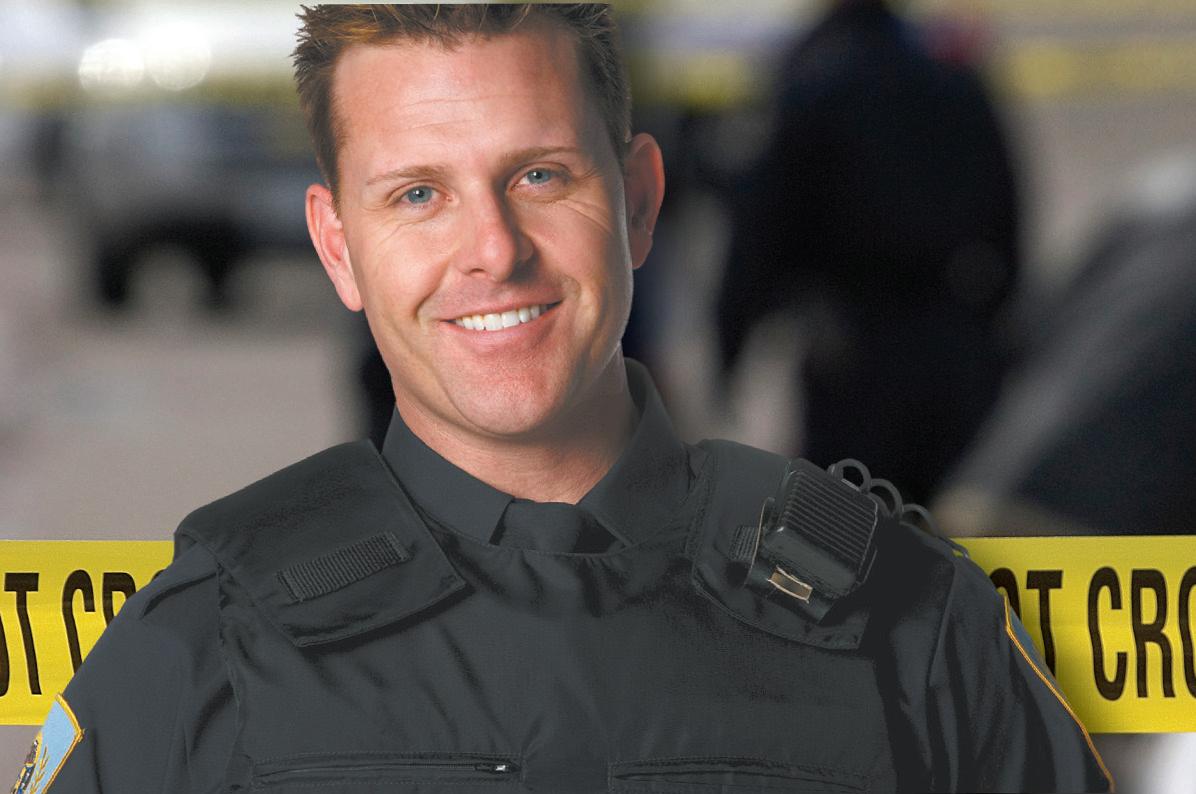

Through its three decades of dedicated service to students, Lewis University has become a regional center of higher education and an innovative community in this evolving fields of Criminal Justice and Public Safety. Through the personalized attention of our faculty, Lewis provides students with a focus on critical thinking skills, an in-depth knowledge of the criminal justice and public safety systems, and the issues they face today. Upon graduation, you’ll be equipped with the leading-edge knowledge and skills to find your opportunity to soar and impact your world for the better.

wis Univ y is to be a partner
University is proud to be a partner in the Yellow Ribbon GI Education Enhancement Program which allows qualified post-9/11 veterans to enroll in more than 100 approved education programs at Lewis University.

EXPLORE
Scan

• Flexible start with 8-week sessions beginning in Fall, Spring and Summer
• 100 percent online option available
• Small, interactive classes so you can grow with your peers led by dedicated faculty who are experts in their field with real-world experience
• Employer tuition discount and deferral plans make Lewis one of the most affordable private universities in the Chicago area
New! First Responders receive a 20% tuition discount and tuition is deferred for 6 weeks after the end of each class
(815) 836-5610
One University Parkway Romeoville, IL 60446

On December 22, Plainfield police Department held their annual Shop with a Cop celebration event in a collaboration with Target and sworn and civilian staff. The grinch even decided to show up for all the lucky kiddos!


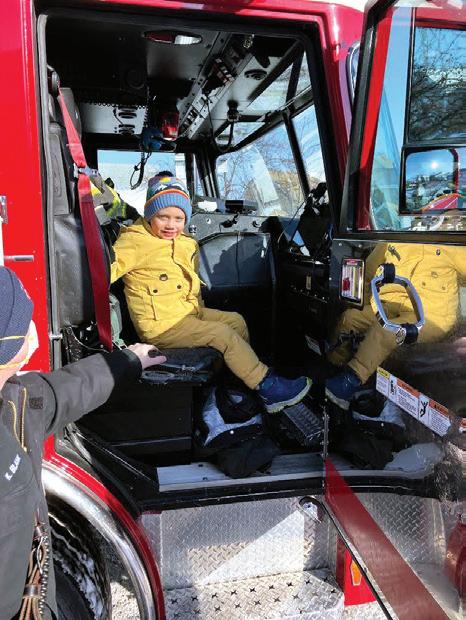
Operation North Pole helps give families with a child living with a life-threatening illness the chance to visit the North Pole on a magical adventure that includes wonderfully festive activities. Local police departments find the time to help the organization by delivering gifts and volunteering their time. Alongside the Wood Dale Fired Department, the Wood Dale Police Department helped complete the mission of Operation North Pole this past holiday season and delivered a cache of gifts to a local family with a child living with a serious illness.
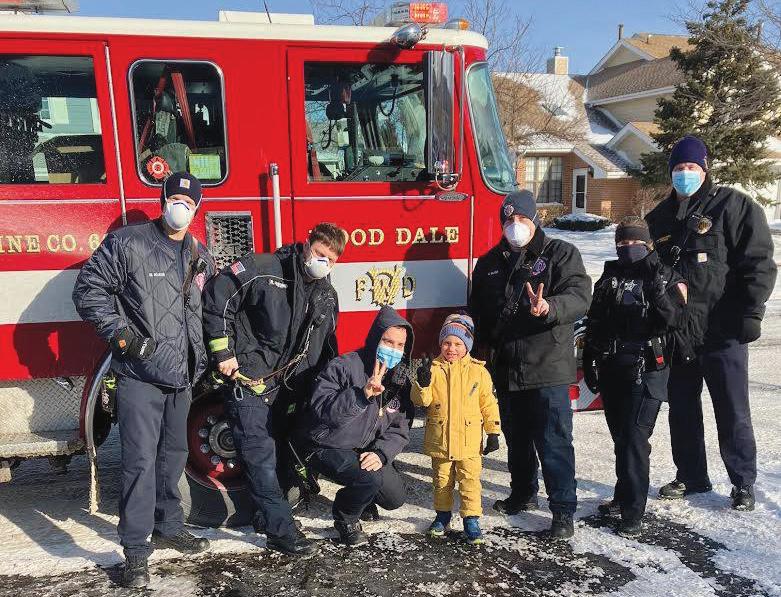
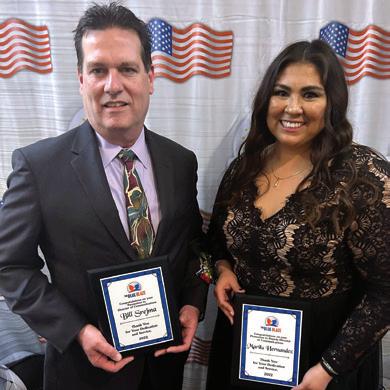
For a second year, the Blue Blaze event has honored the ACDC at their annual event celebrating local first responder departments. Blue Blaze is a charitable organization that helps departments gain access to training and safety programs. The ACDC’s Jacob, David, Chris, Bill, Robert, Aaron, Sarah, Annie and Marilu all received awards at the gala this year.
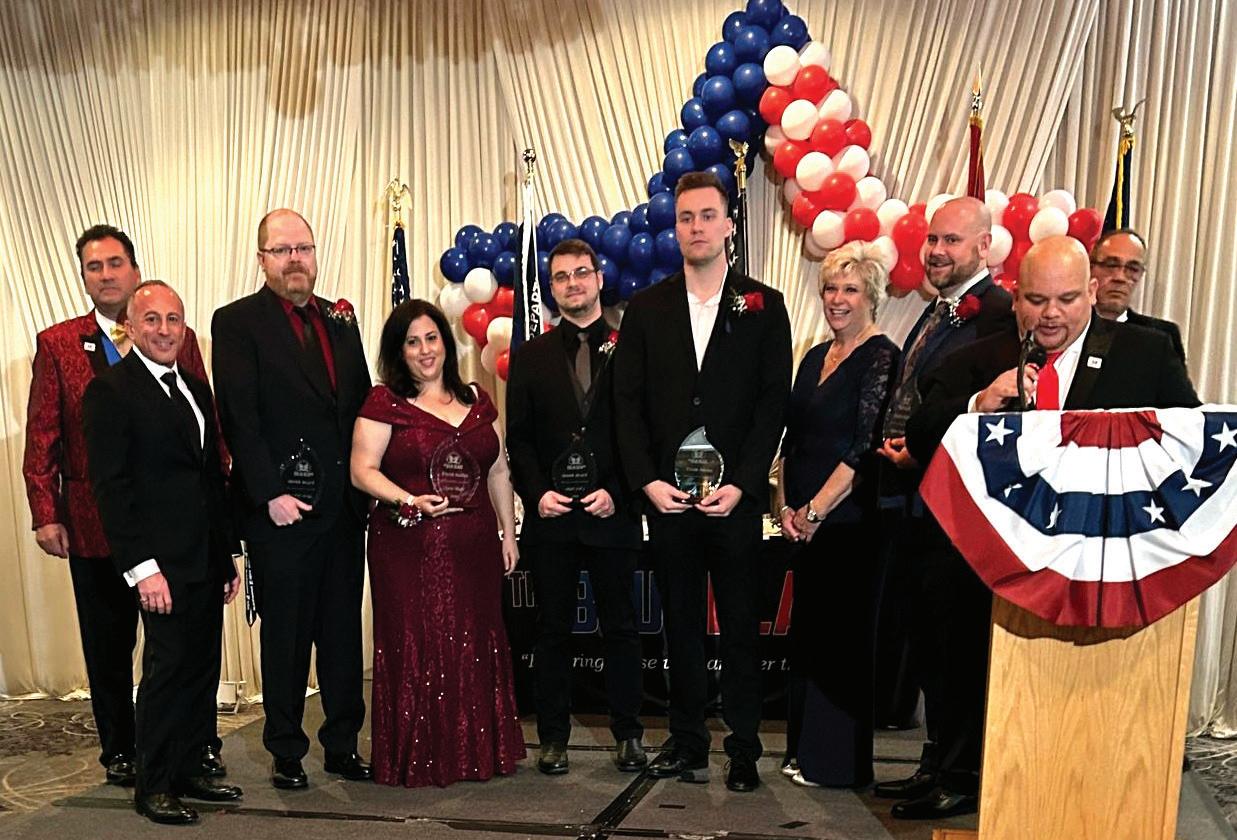
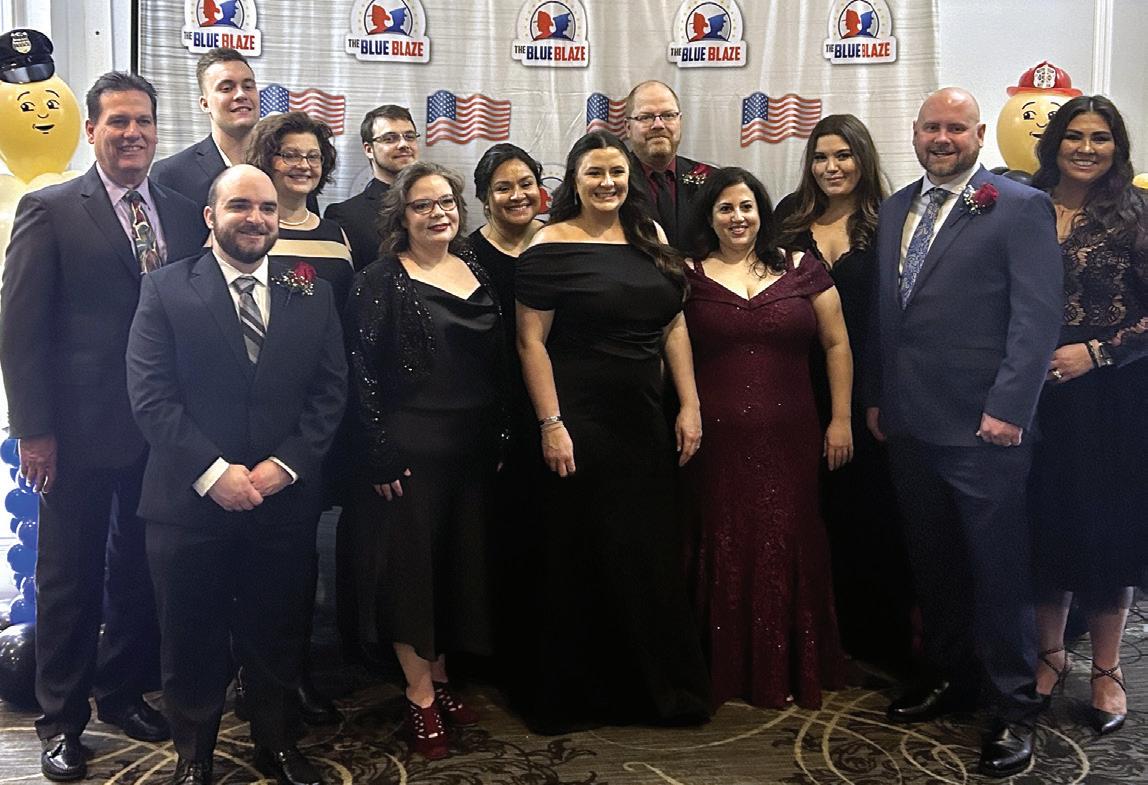
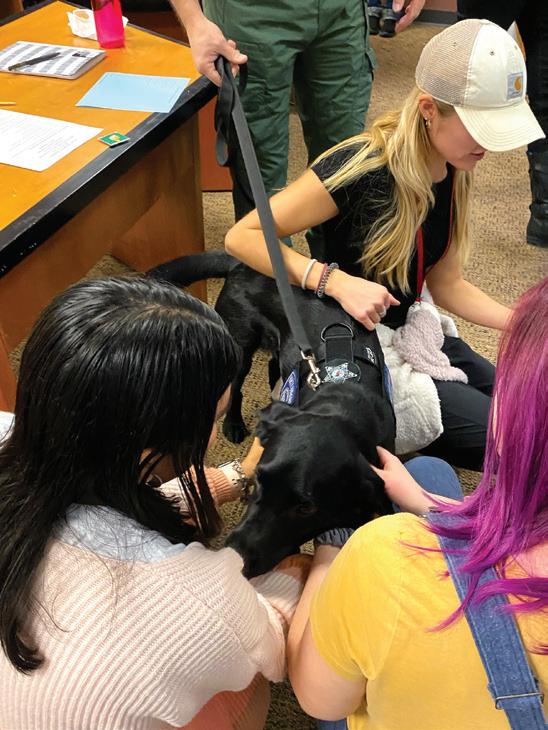
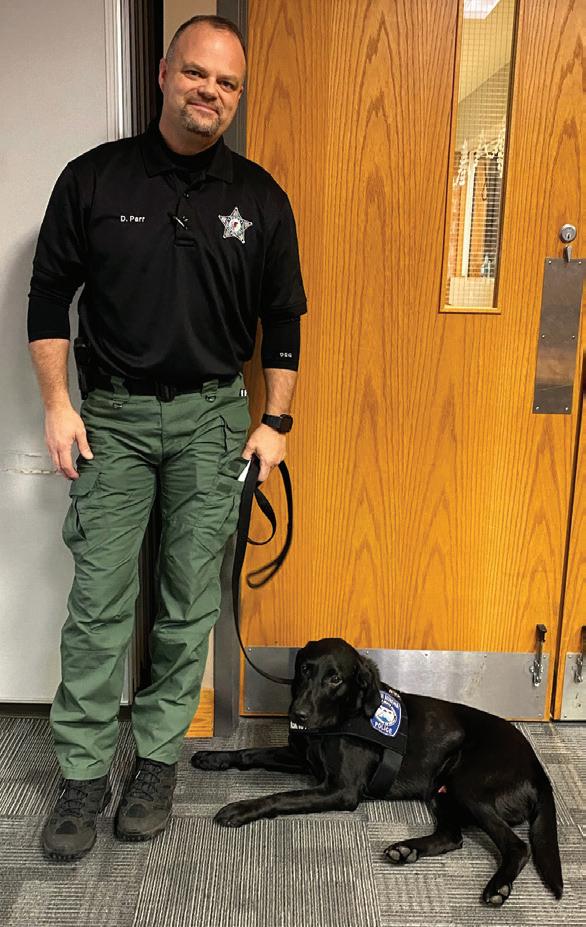
Officer David Parr has delighted the community of North Aurora with his new Comfort Dog, Indiana Jones or, as the pup is better known, Indy. The lab is trained as a therapy dog but is still learning the ropes. It was Officer Parr’s idea to bring a comfort dog on at the department and his presence will help strengthen ties between the community and the police department. Indy has already stolen the hearts of quite a few North Aurorans. Officer Parr is dedicated to serving his community and brightening everyone’s day with Indy.
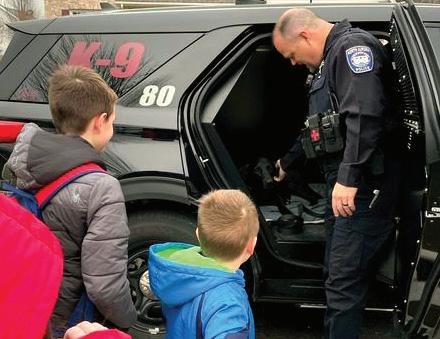


K9 Ava and handler Officer Mary Rose Kendall are excited to be receiving a new bulletproof vest for Ava. The ballistic vest was donated by Spike’s K-9 fund; a nonprofit organization whose mission is to help protect working dogs by donating gear to various K-9 units.
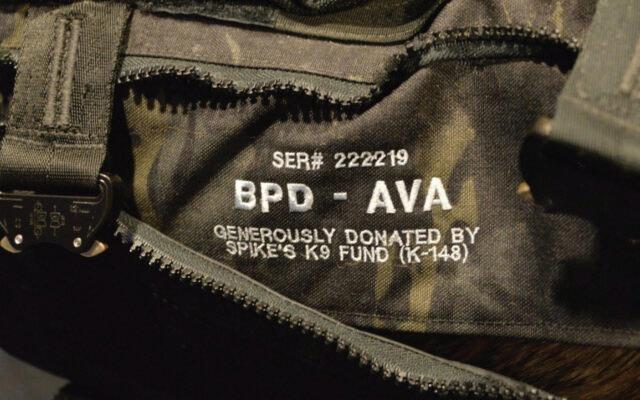
Mundelein Police Department introduced their newest officer, K-9 Ranger. His handler, Officer Freese and Officer Freese’s son gave Ranger his badge at a Village Board meeting, officially introducing him to the community.
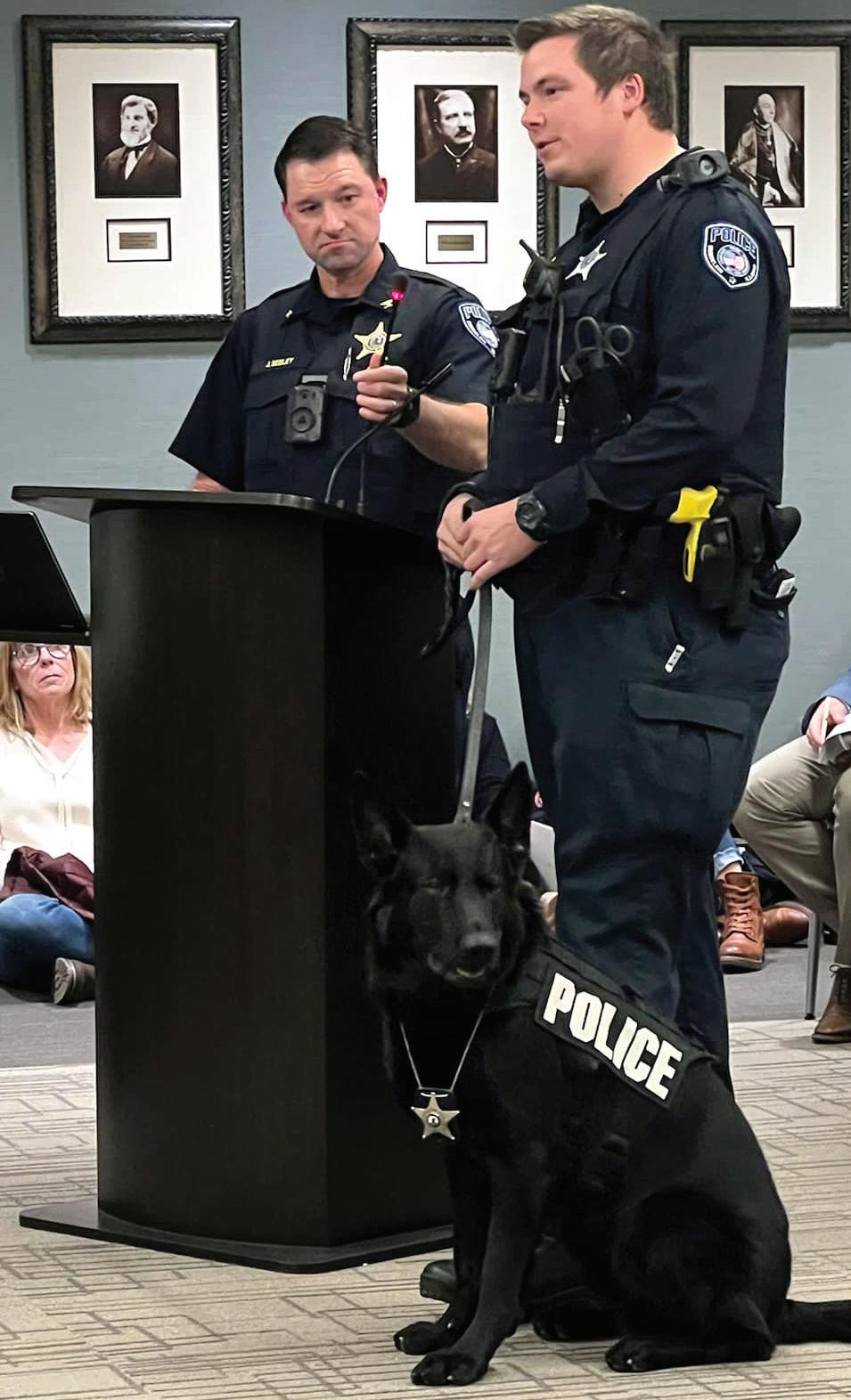
On December 17, NIU PD welcomed Officer Victoria Rodriguez, who graduated the Police Training Institute. On December 18, NIU PD held their holiday party and awarded several members of their department for a job well done.

For their 16th year in a row, the LaSalle County Sheriff’s office held a successful Christmas 4 Kids event at the Walmart. Case workers helped the deputies with the kiddos, and everyone had an amazing time. These events are truly so important to the community as a whole. With the help of donations, the Sheriff’s Office shopped for 104 kids to help make their holiday wishes come true.
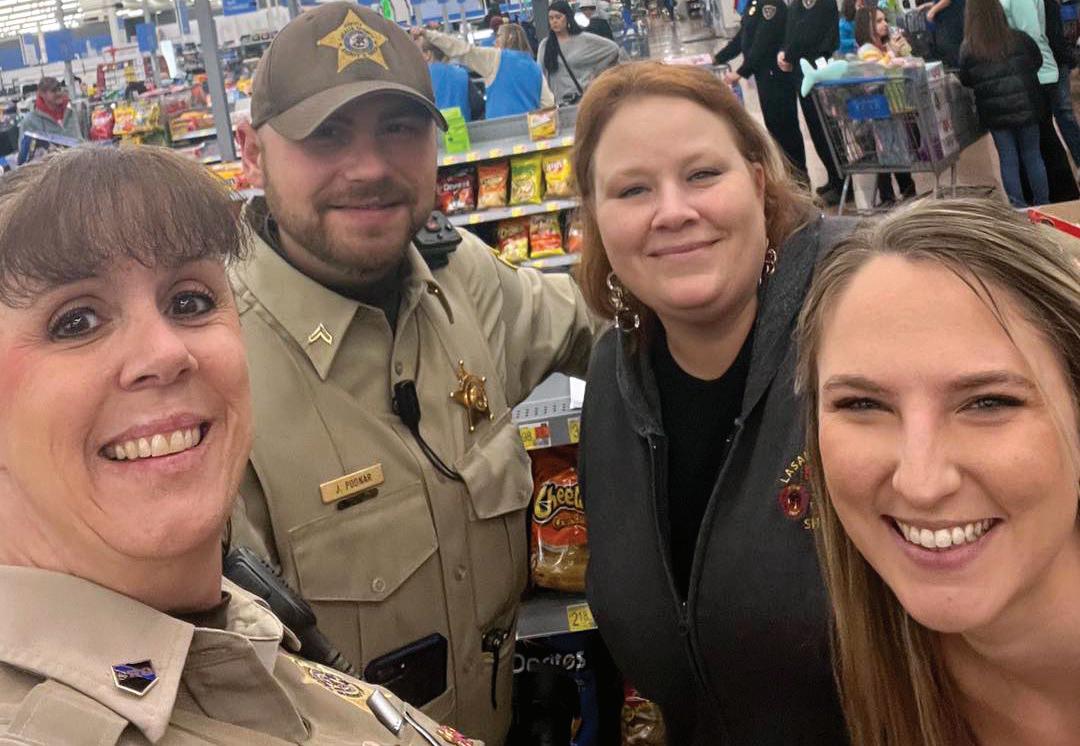
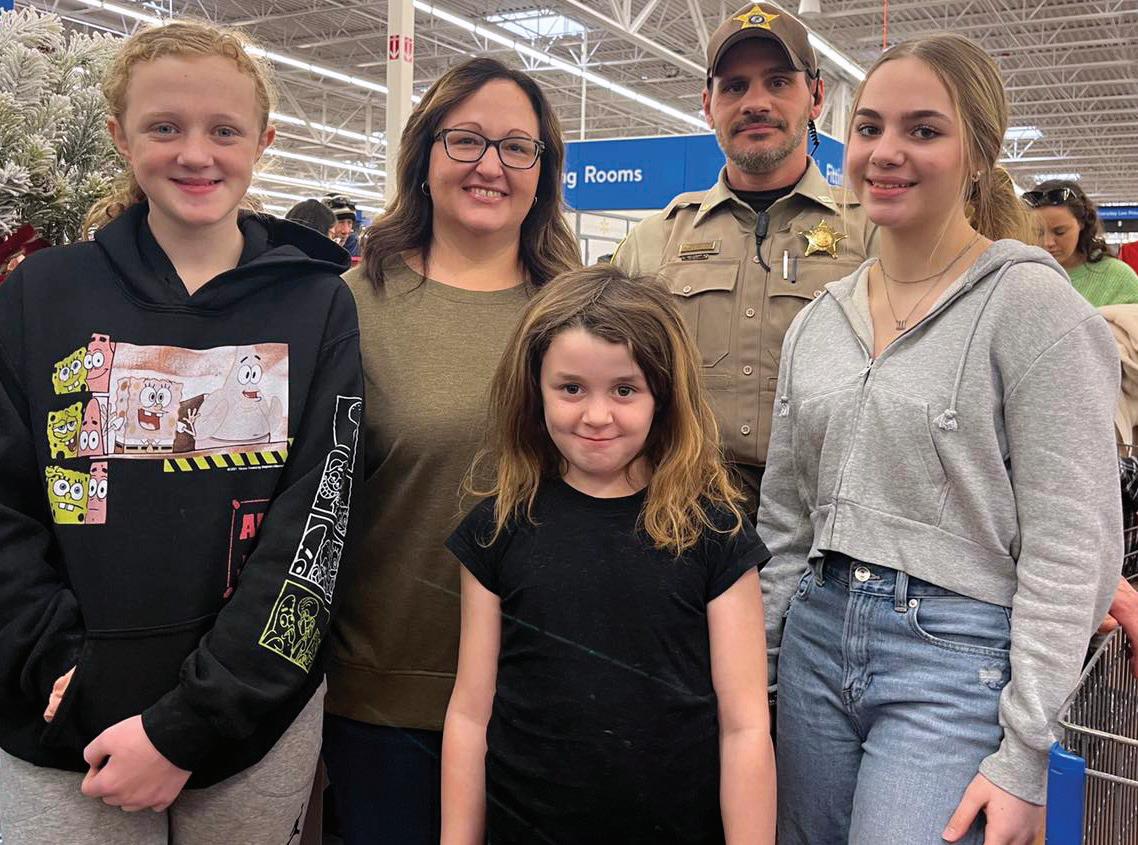
Kane County Sheriff’s Deputies were told a little boy turning five was having a first responders themed birthday party and decided to surprise little Aidan. Deputy Susan Deuchler, McGruff the Crime Dog and Sparky the Fire Dog showed up to make his party extra awesome and giving Aidan the gift of a lifetime!
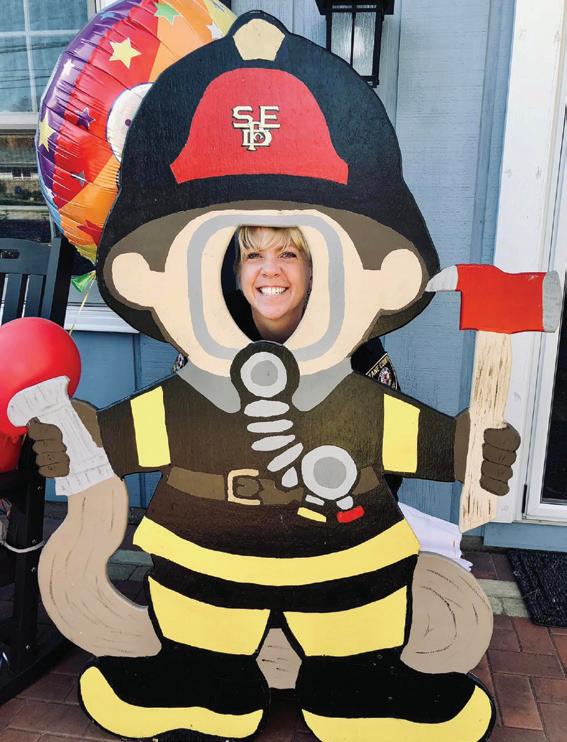

Congratulations are in order for the retirement of DuPage County Patrol Deputy Kristen Grossi after 26 years and Deputy Edward Sokasits after more than 25 years!


By supporting Northern Illinois Food Bank, you help build a stronger community. From nourishing our children and seniors year-round with easier access to fresh, nutritious food to connecting neighbors with resources at our network of 900 food pantries and programs — when you give today, we thrive tomorrow.


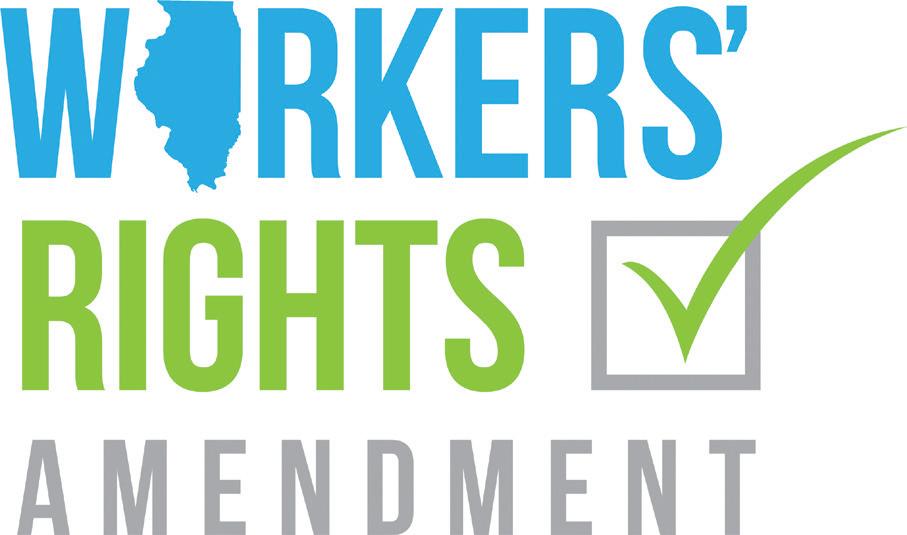
On November 8, 2022, the people of Illinois affirmatively voted to amend the Illinois Constitution, adding Section 25 to Article I of the Illinois Constitution. On December 15, 2022, Governor Pritzker issued a public proclamation, in accordance with the statute, declaring the result of the election and formally cementing the Workers’ Rights Amendment for all working people across the state. As of December 15th, the Workers’ Rights Amendment is law. What does this mean for our members? Well, it protects all employees’ right to organize and bargain collectively regarding wages, hours, and other terms and conditions of employment. Meaning, the legislature cannot pass a statute diminishing your right to bargain over these matters. Additionally,
using the term “employees” may greatly expand the pool of people who can organize and collectively bargain. In practical terms, this may include many ranks and positions not previously permitted to huddle together and negotiate with their employer.
Secondly, this amendment potentially expands bargaining rights. Specifically, the Amendment includes the right to bargain “to protect their economic welfare and safety at work.” These terms go beyond the current language contained in the Illinois Public Labor Relations Act, the statute governing labor relations between public employees and their public employers. In the Union’s view, this language greatly expands the right of our members to bargain over a variety of issues in public safety.

As you can imagine, the peripheries of this amendment are largely undetermined. Much of its expansiveness will be decided through the process of litigation; namely, future court decisions. One thing is certain, public safety employees have a strong voice in the workplace. That voice is unquestionably stronger following the passage of the Workers’ Rights Amendment. MAP will continue to use all legal means to protect and expand your right to bargain collectively over issues that matter to you. MAP has never shied away from aggressive advocacy on behalf of its members. Stay tuned and stay safe.
Mark McQueary, MAP Deputy Director of Legal Affairs 23 JUDICIAL CIRCUIT/ CRT SVCS KENDALL CO
Cynthia Huey
Nathan Schuster
ADDISON
Brayan Covarrubias
ALSIP
David Carreon
ARLINGTON HTS
Kevin Zaremba
BARTLETT
Akeel Abdelhadi
Nicholas DeJesus
Mark Doyle
Daisy Sallis
BLUE ISLAND POLICE CLERKS
Lisa Petersen
BOLINGBROOK
Hristo Bojilov
La'Darius Nolan
Brian Perez
Joseph Ratajczak
Adam Suszka
Bryan Weller
BOLINGBROOK PROF
EMP
Amanda Meierdirk
Paula Shrum
BRIDGEVIEW
Paul Desilva
BUFFALO
Grove Chad Larys
CARPENTERSVILLE
CIVILIAN
Carmen Velez
Lesley Viveros
DEKALB CO
Panagiotis Athanasatos
Reann Campuzano
Brenda Sharp
Alcides Bernal
Adam Denny
Trevor Miller
Sharon Mortakis
Nino Ristich
Bridget Rukavina
Diana Young
DES PLAINES PD
Saad Saeed
Dupage Co
Adrian Alicea
Robert Rodway
E-COM
Susan Bischoff
Julie Janis
ELGIN COMMUNITY COLLEGE
Juan Morales
ELWOOD
Timothy Alsip
Drin Bajrami
GLENVIEW
Zachary Barth
Cory Evans
GRUNDY CO CIVILIANS
Bobbi Brakebill
Karen Norton
HANOVER PARK
Shawna Elleson
Kamil Labanowski
HARVEY PATROL
David King-Booker
HARWOOD HTS CIVILIANS
Jonathan Welninski
HAWTHORN WOODS
Jacobo Hernandez
HAZEL CREST
Christopher Earls
Darius Johnson
Elizabeth Perkovich
HOFFMAN ESTATES
Ryan Camarara
Frank Novello
Alissa Sanchez
HUNTLEY
Logan Frank
INDIAN HEAD PARK
Michael Majewski
ISTHA
Shawntel Collins
Bridget Dauksas-Roy
Amanda David
Angela Fraizier
Julie Jadwin
KANE COUNTY
Brian Anderson
LAKE CO CORRECTIONS
SGTS
Lana Lemons
LAKE CO SGTS
Matthew Harmon
Jakub Klatka
Javier Perez
LAKE FOREST
Salvador Enriquez
LAKE IN THE HILLS
Ryan Halford
LAKE IN THE HILLS CIVILIANS
Gabriela Kakareko
LAKEMOOR
Mitchell Bujak
LASALLE CORRECTIONS
Karlee Arjes
Rachel Bottcher
Austin Cinotto
Felicia Waite
LASALLE PATROL
Juan Godina
Noah Hancock
Jake Schmollinger
MAYWOOD PATROL
Latanja Agee
Jaime Cajigas
Christopher Fuqua
Thania Garza
Aaron Gibson
Willie Giddens
Donna Herrera
Matthew Lukaszek
Joshua McAllister
Latonya Morgan
Jacob Nunez
Janette Santoyo
MCCOOK
Dylan Lorek
Marcelo Perez
METRA
Dominic Carabez
Jose Meza
Ildefonso Padilla
Matthew Phillips
Alberto Reyes
Andrew Sakas
MOKENA
Keith Lanaster
MORAINE VALLEY COLLEGE
Matthew Ward
MORRIS
Jose Hernandez
Michael Thompson
MT PROSPECT
Eric Kimbrough
John Welliver
MUNDELEIN
Jecoa Osoria
NAPERVILLE CIVILIANS
UNIT 2
Alison Ali
NAPERVILLE SGTS
Scott Hiestand
Jason Oganovich
Frank Tonkovich
NILES
Jesse Bloomberg
Carlos Siggarrostegui
NORRIDGE
Joseph Annunzio
Visal Chum
Hung Le
Nicholas Tomasso
NORTH AURORA
Ryder Kern
Cody Klingberg
NORTHBROOK
Terrence Joria
NORTHWEST CENTRAL DISP
Carolyn Bielawski
Annalisa Cangelosi
Gia Gratzianna
Lauren Schmidt
Amy Wilson
OAK FOREST
William Dickman
Nicholas Ebert
Brian Fleck
Daniel Valley
OAK LAWN
Aguilos Alekhine
Daniel Cronin
Iarahim Mansour
Robert Schmidt II
OAK LAWN DETENTION OFFICERS
Raymond Boersma
ORLAND PARK
Patryk Bednarz
Lindsey Vanderlaan
PARK RIDGE PATROL
Andrea Franco
PINGREE GROVE
Jeffrey Chandler
Shigeharu Hatanaka
PROSPECT HEIGHTS
Carlos Collazo
QUADCOM
Keirstin Ammaturo
Lynn Richards
Candice Zielinski
ROMEOVILLE
Juan Flores
Anthony Panko
ROUND LAKE PARK
Anthony Santos
SCHAUMBURG
Sam Bryant
Nicholas Krok
Alejandro Perez
Antonio Sanchez Ramirez
Jonathan Santiago
Michael Welch
SEECOM
Alison Indvik
SOUTHCOM DISPATCH
Sarah Munie
Turia Washington
STREAMWOOD
Matthew Zeiger
TINLEY PARK
Jeremy Klimasara
Jarret Tinman
TRICOM CENTRAL DISP
Alexis Capas
Brenna Plonis
Bailee Slone
UNIV OF IL
Cesar Guillen
Brandon Thompson
WAUKEGAN SGTS
Joshua Amann
Mallory Baker
Jaroslaw Grzeda
WESCOM DISPATCH
Daniel Jenkin
Jennifer Omiecinski
Brittany Scully
Angelica Tovar
WESTERN SPRINGS
Kevin Jankist
WILL CO MGMT
Gregory Whited
WILLOW SPRINGS
Keith Beausoleil
Mark Wirth Jr
WILMINGTON
Hunter Imhof
WINFIELD
Daniel Kindle
Matthew Sieber
WOOD DALE
Thomas McKendry
Sean Nicholas
Welcoming new members, celebrating promotions, honoring retired members and more
BUFFALO GROVE
Meghan Hansen
KurtLowenberg
BRIDGEVIEW
Justin Brown
BUFFALO GROVE
Jaime Verduzco
CRYSTAL LAKE
Algirdas Sindaravicius
HANOVER PARK
Sabina Hosea
HAWTHORN WOODS
Anthony Cortez
HUNTLEY
Marques Griffith
LAKE FOREST
Scott Christensen
Philip Gualdoni
Matthew Signa
MAYWOOD
Benjamin Martinez Jr
NAPERVILLE SERGEANTS
Ricky Krakow
NORTHEASTERN IL UNIVERSITY
David De Clet
OAK LAWN
Timothy Shanahan
RIVERWOODS
William Kirby
SOUTH HOLLAND
Matthew McGeever
SCHAUMBURG
Kevin Chandler
David Winston
UNIVERSITY OF IL/ CHICAGO
Tawanna Clark
Daniel Esquilin
Michael Murphy

WAUKEGAN SERGEANTS
George Valko
WESTERN SPRINGS
Kingsley Church
WHEATON SGTS/LTS
Justin Sanchez
WILL COUNTY
Daniel Troike
James Zdzinicki
WOOD DALE
Arthur Zlotnicki
The Links at Carillon • 21200 S Carillon Dr, Plainfield
Monday, June 19, 2023

Noon Shotgun Start (11am check-in) • Dinner Reception starts at 5:15pm
ENTRY FEE: $125 per player for Greens Fees, Golf Cart, Lunch, Buffet Dinner, Drinks, with a Raffle to follow Dinner. $45 for Dinner only.

PAYABLE BY: June 5, 2023. Space is limited. FIRST PAID, FIRST RESERVED
For more information and sign up forms, contact the MAP Office at 630-759-4925 or MapOffice@mapunion.org
Charles Houch
ELK GROVE VILLAGE
Kelly Sweeney
GLENWOOD
Joseph Guzolek
HANOVER PARK SGTS
Daniel Bers
HARVEY PATROL
Ramon McCalpine
HOMEWOOD
Paul Werner
LASALLE CO CORRECTIONS
Timothy Clark
Charles Diss
LASALLE CO PATROL
Robert Reid
MORAINE VALLEY COLLEGE

Steven Daddona
MUNDELEIN
Dan Schmidt
NAPERVILLE SERGEANTS

Ken Keating
NILES
April Rider
OSWEGO
Patrick Wicyk
SCHAUMBURG PATROL
Scott Layne
JEFFREY WALSH
Streamwood Patrol
Sean Stretch
TINLEY PARK
Roger Davisson
UNIVERSITY OF IL/ CHICAGO
Henry Lee Jackson
VWARRENVILLE PATROL
Catt Adam
WAUKEGAN SGTS
Barrett Mays
WILMINGTON
Jose Campos
WINNETKA
Ian Levy
WOODRIDGE
Luis Rodriguez
Welcoming new members, celebrating promotions, honoring retired members and more

